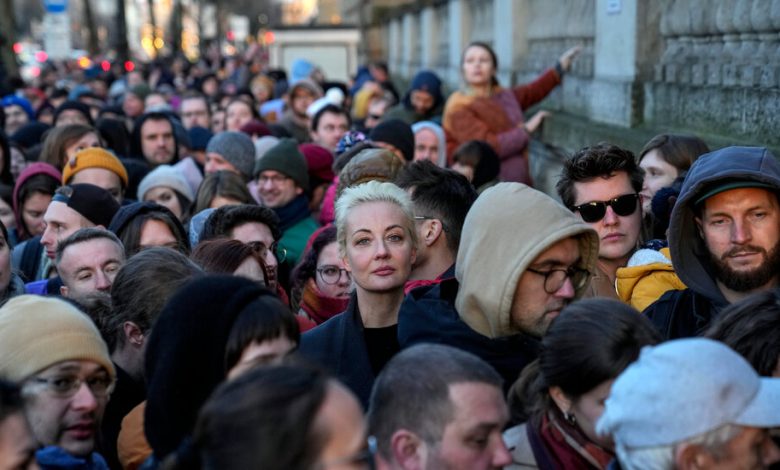Russia Places Navalny’s Widow on Extremist List

Russia has placed the widow of the late opposition campaigner Aleksei A. Navalny on its official terrorist and extremist list, days after charging her in a Moscow court with “participating in an extremist community.”
Rosfinmonitoring, the Russian government body assigned to combat money laundering and terrorism financing, added Yulia Navalnaya to the list as an extremist, according to a search on Thursday of its online database.
Inclusion on the list allows the Russian authorities to block bank accounts of the designated individual and restrict other financial activity.
Ms. Navalnaya, who left Russia in 2021, pledged to continue the work of her husband after his death February in a Russian prison colony north of the Arctic Circle. She has accused Russia’s president, Vladimir V. Putin, of the murder of her husband and rallied Western officials to come up with new ways to fight Mr. Putin’s regime.
Her addition to the list came days after the Basmanny District Court in Moscow ordered Ms. Navalnaya’s arrest and said she would be placed on the country’s international wanted list. The court didn’t detail the charges other than saying she had participated in an extremist community.
Mr. Navalny’s Anti-Corruption Foundation was branded an extremist group by Russian authorities in 2021 and has been forced to leave the country to pursue its mission — exposing the corrupt practices of Mr. Putin’s elite by uncovering their yachts, mansions and other luxuries. It now operates out of Lithuania. Ms. Navalnaya leads the group’s advisory board and is a member of its board of directors.
Ms. Navalnaya rejected the charges Tuesday in a mocking statement on X.
“When you write about this, please do not forget to write the main thing: Vladimir Putin is a murderer and a war criminal,” the statement said. “His place is in prison, and not somewhere in The Hague, in a cozy cell with a TV, but in Russia — in the same colony and the same two-by-three-meter cell in which he killed Aleksei.”
A spokeswoman for the Anti-Corruption Foundation didn’t immediately respond to a request for comment about the new extremist list designation.
Russian state news initially reported that Mr. Navalny had died from a blood clot. The head of the country’s foreign intelligence service later said the opposition campaigner died of “natural causes.” Mr. Putin described his death as an “unfortunate incident.”
Mr. Navalny’s body was withheld from his family in the days after his death, undermining the possibility of an independent autopsy.
The Russian opposition campaigner almost died after being poisoned in 2020 by a nerve agent during a trip to Siberia. The U.S. government determined the poisoning had been an assassination attempt by Russia’s Federal Security Service.
After recovering in Germany, Mr. Navalny returned to Russia the following year. He was swiftly arrested.
In the years since, he was subjected to increasingly hazardous conditions in Russian prison, including repeated detentions in solitary “punishment” cells, often without proper heat. He was being held in one such cell when he died.
Oleg Matsnev contributed reporting.